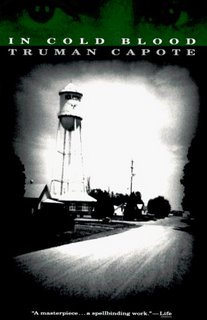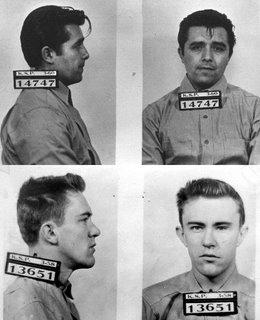In Cold Blood

My first encounter with In Cold Blood was early this year, when I was hypnotized by pre-Oscar hype and made it a point to watch most of the flims which were nominated and screening here (Brokeback, Mrs Henderson Presents, Munich, Syriana, Transamerica etc). Of course, the main buzz surrounding Capote was Philip Seymour Hoffman's riveting and compelling portrayal of the author, which eventually won him the award for Best Actor.
Thus, I approached this novel knowing full well what was going to happen, from the senseless murder of the Clutter family to the hysteria that surrounded the case, the personalities of and relationship between the two murderers, their many years spent on death row, and their eventual hanging.
Taking this into account, you won't find me commenting on the cruelness of it all, or the repulsive lack of any remorse whatsoever, on the part of the killers. They would do it all again, given the chance.
Indeed, what drew me to this book was really Capote's literary genius. I love how he can describe a feeling, behaviour or circumstance by using metaphors that are so completely far-out but evoke the subject matter flawlessly.
Take, for example
The biography always set racing a stable of emotions - self-pity in the lead, love and hate running evenly at first, the latter ultimately pulling ahead.
Comparing his emotions with HORSES! If I just verbally describe this device, most people would go "That sounds terrible!" But when you actually read it for yourself, it's so beautiful...and simple. There's no fancy smancy vocab, the literary device used(that would be a metaphor right =p) is very basic, and yet it just completely brings out the idea he is trying to convey.
Another example in a similar vein,
'...I wonder why I did it.' He scowled, as though the problem was new to him, a newly unearthed stone of surprising, unclassified colour. 'I don't know why,' he said, as if holding it to the light, and angling it now here, now there.
I visualised a person, holding a magnifying glass to the stone, holding it above his eye, carefully studying it, as if he had never quite seen anything like it. And that perfectly describes the situation here doesn't it? Perry Smith never actually *really* thought about the murder he committed. This was his first time examining his motive (or lack of), hence the unfamiliarity. It must be said that a case might be made for the fact that they were simply not pychologically stable. The book does delve into pyschoanalysis that I don't really remember from the movie (which was more foucsed on Capote's own life anyway). A person just can't be stable in the mind if he can bring himself to committ such a random and seemingly senseless act that was not the result of any grudge against the specific person (or group of people) or of provocation on their part. It just doesn't make sense.
Anyway back to my fawning over Truman Capote's art.
Born In Texas, he was the younger child of fertile, moneyless, embattled parents who, when finally they separated, left their progeny to fend for themselves, to scatter hither and thither, loose and unwanted as bundles of Panhandle tumbleweed.
HAHA! It's so bitchy and humourous! Just think about the mental image for a moment. There. You have the idea of how discarded this person was as a child.
The second thing that really struck me was how, throughout the novel, and especially in the latter two chapters, I had to continually remind myself that what I was reading *really* happened, and that it wasn't the twisted, sick fantasy of a flamboyant queen, which was what Truman Capote was, as we all know. He may have added his embellishments here and there, but the facts surrouding the murder and the following years really did happen. It's just amazing that non-fiction can seem so much like something taken from the latest Hollywood horror script. I suppose it adds to the surreal nature of the whole case.
One more thing that I was pondering over. Nature versus Nurture. Yes, THAT debate again. Surely, no one is actually BORN to become a cold blooded murderer? Perhaps this wouldn't have happened if they had made it to college? But then again, Lowell Lee Andrews (who murdered his entire family for no apparent reason and was on Death-row with Perry and Dick), was an honours student at the University of Kansas. So it's some raging gene in them then? But how to you explain Dick's situation then? His parents were (seemingly) such nice and harmless people, to the point where you *really really* pitied them for having to bear the guilt and shame that their son had no intention of carrying.

I don't know really. It makes you think. Anyway, everyone should read In Cold Blood. It's a triumph of literature and journalism, all rolled into one. Bye now.

0 Comments:
Post a Comment
Subscribe to Post Comments [Atom]
<< Home